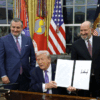The New Mexico Supreme Court recently announced that it will consider the case of a Christian photographer who objected for religious reasons to photographing a same-sex commitment ceremony.
The photographer, Elaine Huguenin, says she refused to photograph the ceremony because the message it communicated was in conflict with her religious beliefs.
Because of her refusal, Huguenin’s business was hauled before the state human rights commission, found guilty of discrimination, and forced to pay nearly $7,000 in attorneys’ fees to the complainant.
The case is just one illustration of how individuals and institutions with traditional beliefs about marriage, family, and sexuality face significant threats to their religious and moral conscience. Other examples include:
- The chicken restaurant Chick-fil-A has been targeted by various public officials because the company’s owner voiced support for marriage as one man and one woman.
- Several Christian charities have been forced to stop providing foster care and adoption services because they cannot in good conscience comply with laws that would require them to violate beliefs about marriage and family.
- Boy Scouts of America has lost equal access to public facilities and programs because of its position on open homosexuality.
- A graduate student claims that she was expelled from a public university counseling program after she conscientiously objected to counseling a potential client seeking assistance regarding a homosexual relationship.
- A Christian organization at a public university was denied official recognition because it required officers and voting members to adhere to traditional Christian teachings, including a prohibition on extramarital sex.
This is not “live and let live.” This is the state—and sometimes private citizens and the culture at large—punishing people who refuse to recant their beliefs regarding marriage, family, and sexuality.
The better approach is to respect and protect freedom of religious and moral conscience. It is an effective and principled way to promote social peace and civic fraternity in an increasingly pluralistic society.































10 Replies to “New Mexico Photographer’s Religious Freedom Case Goes to State Supreme Court”